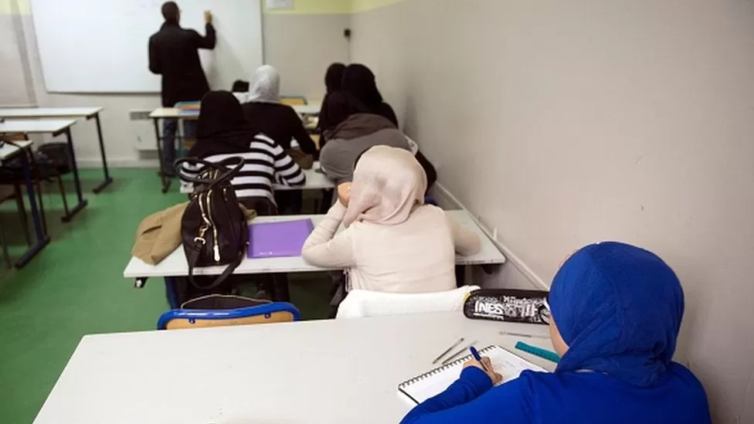The French education minister has said that nearly 300 pupils arrived at school on Monday wearing the abaya, the long Muslim robe which was banned in schools last week.
Most of the girls agreed to change into other clothes.
According to official figures, 298 girls - mainly aged 15 or more - turned up at school in the banned garment.
Under instructions laid down by the ministry, there followed in each case a period of dialogue with school staff.
Most girls then agreed to dress differently and were able to start classes.
However, 67 girls refused to comply and were sent home.
A further period of dialogue with their families will now ensue. If that fails, they will be excluded.
Set against the 12 million school boys and girls who started term on Monday, the government believes the figures show that its ban has been broadly accepted.
However, a legal challenge by a group representing some Muslims goes before the courts later today.
At the end of August, the education minister announced that pupils would be banned from wearing the loose-fitting full-length robes worn by some Muslim women in France's state-run schools at the start of the new school year on 4 September.
France has a strict ban on religious signs in state schools and government buildings, arguing that they violate secular laws.
Wearing a headscarf has been banned since 2004 in state-run schools.
The move comes after months of debate over the wearing of abayas in French schools.
The garment is being increasingly worn in schools, leading to a political divide over them, with right-wing parties pushing for a ban while those on the left have voiced concerns for the rights of Muslim women and girls.
In 2010, France banned the wearing of full-face veils in public, provoking anger in France's five million-strong Muslim community.
France has enforced a strict ban on religious signs at schools since the 19th Century, including Christian symbols such as large crosses, in an effort to curb any Catholic influence on public education.
Reflecting its changing population, it has updated the law over the years to include the Muslim headscarf and Jewish kippa, but abayas have not been banned outright until now.
Latest Stories
-
Private citizen petitions Mahama to sack GIFEC CEO Rashid Tanko-Computer over alleged ‘fake’ PhD
18 minutes -
Quarry operators warn of nationwide shutdown over encroachment threats
38 minutes -
Ecobank Ghana approves GH₵0.34 dividend for 2024, records GH₵5.4bn revenue
44 minutes -
Ga East MCE engages Ga Chiefs to foster developmental unity
47 minutes -
Mahama pardons 62 radio stations sanctioned by NCA
50 minutes -
Over 1.1 million children trapped in labour – CHRAJ warns
1 hour -
8 BECE candidates injured in fatal crash, denied exam after late arrival
1 hour -
GNFS saves majority of cargo in trailer fire on Accra-Kumasi highway
1 hour -
Telecel Ghana launches “Too Much Money” promo with GHS1.2m grand prize
2 hours -
Government, CIMG deepen collaboration to support brand Ghana Agenda
2 hours -
Government vows to recover unauthorised payments to Zoomlion
2 hours -
KNUST Mastercard Scholars hand over cluster of projects to Ayigya Basic School
2 hours -
Gabby Otchere-Darko confirms Asaase Radio shutdown amid NCA crackdown
2 hours -
Fair Wages Commission reacts to calls to re-negotiate nurses’ conditions of service
2 hours -
5.3% Q1 GDP growth a good sign – Mahama assures stability and prosperity for all
3 hours

